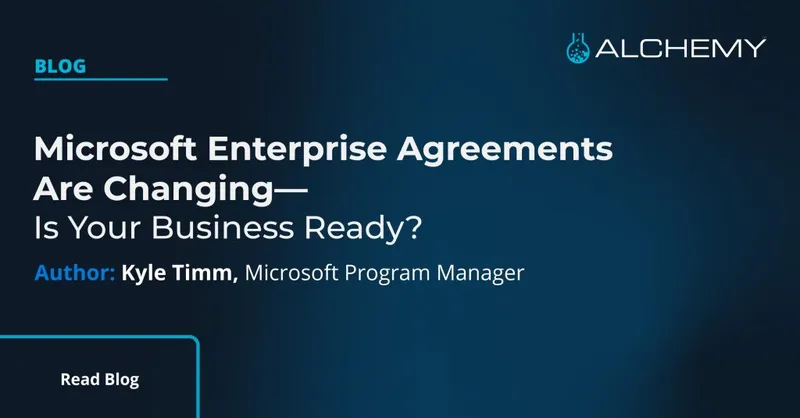Microsoft Enterprise Agreements Are Changing—Is Your Business Ready?

Microsoft is making major changes to its Enterprise Agreement (EA) program, impacting how organizations manage their software licensing. If your business relies on an EA, you’ll need to reassess your licensing strategy to avoid unexpected costs and disruptions.
What’s Changing?
Starting January 2025, Microsoft is phasing out Enterprise Agreements for some customers, particularly those in Level A (up to 2,400 users). This means affected businesses must transition to a new licensing model.
Who’s Affected?
- Organizations in the Level A tier (confirm eligibility with Microsoft or a partner).
- Businesses with expiring EAs that no longer qualify for renewal.
How This Impacts Your Business
-
You Must Transition: If your business falls under the affected category, you’ll need to move to a new licensing structure before your EA expires.
-
Pricing May Change: Switching from an EA could increase or decrease your costs depending on your products, usage, and negotiated terms. Don’t rely on generic estimates—conduct a cost analysis specific to your business.
-
New Agreement Options: Microsoft offers two primary alternatives:
-
Microsoft Customer Agreement for Enterprise (MCA-E) – A direct agreement with Microsoft, ideal for large enterprises that need more control over licensing.
-
Cloud Solution Provider (CSP) Program – Licensing through a Microsoft partner, offering flexible payments, managed services, and additional support (varies by provider).
-
-
Loss of Benefits: Some EA-exclusive benefits, like step-up licensing and certain Software Assurance (SA) perks, may not carry over. Review what your business relies on before switching.
Choosing Between MCA-E and CSP
Picking the right option depends on your business needs:
| Option | Best For | Key Benefits |
|---|---|---|
| MCA-E | Large enterprises needing direct Microsoft agreements | Full control over licensing supports both on-prem and cloud deployments |
| CSP | Businesses wanting flexibility and partner-managed services | Subscription-based pricing, tailored support, and scalability |
Other options include:
- Microsoft Products and Services Agreement (MPSA) – For businesses needing transactional licensing.
- Server and Cloud Enrollment (SCE) – For organizations prioritizing server and cloud
How to Prepare for the Transition
Step 1: Review Your Current EA
- Check your EA renewal date and terms.
- Identify which software and benefits you rely on.
Step 2: Analyze Your Future Needs
- Consider cloud adoption, infrastructure changes, and growth plans.
- Compare MCA-E and CSP to see which aligns best.
Step 3: Conduct a Cost Analysis
- Model different scenarios to see how licensing changes will impact your budget.
- Work with a Microsoft licensing expert to optimize costs.
Step 4: Get Expert Guidance
Navigating these changes can be complex. Alchemy Tech Group can help:
- Free Licensing Assessment – We’ll analyze your EA and identify cost-effective options.
- Tailored Licensing Strategies – MCA-E or CSP? We’ll find the best fit for your business.
- Seamless Transition Support – Ensure a smooth migration without surprises.
- Maximize Your Microsoft Investment – Get the most value out of your licensing.
Act Now to Avoid Licensing Disruptions
Don’t wait until the last minute! The sooner you start planning, the better positioned your business will be. Contact Alchemy Tech Group today for a consultation and get ahead of Microsoft’s 2025 EA changes.
Author